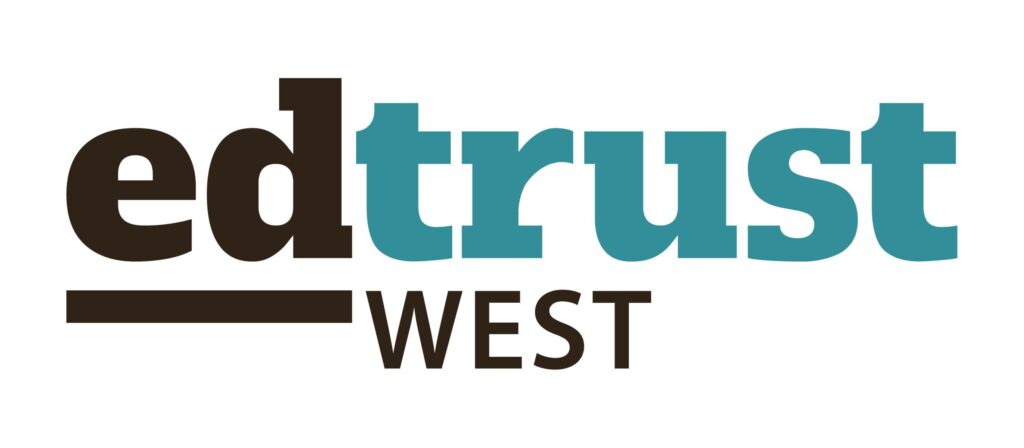With over two million children under the age of five in California, the state’s recent investments in early learning programs were met by many advocates with a telling sentiment: it’s about time – especially for children of color. Research shows—and has shown for many years—that children who have high-quality learning opportunities in their earliest years see huge benefits in social-emotional development and academic achievement in everything from reading to science. Yet these opportunities are costly and far too often limited for the state’s Black and Latinx families. In fact, as of 2019, fewer than one out of every three Black or Latinx three- and four-year-olds were enrolled in state-funded preschool programs in California. According to a recent UC Berkeley study, Black families are less likely to be enrolled in transitional kindergarten than other groups.
The importance of early learning opportunities, and the longstanding equity issues in their delivery, must mean we’re not just focused on investing in these programs, but on their effective, equitable implementation. EdTrust—West’s 2023 Policy Agenda addresses priorities not just for K-12 and higher education but also for early learning and care. As organizations like our partner Early Edge, regularly remind the field of education and policymakers: equity in access and opportunities must start before elementary school.
EdTrust—West is highlighting key early learning policy priorities that are timely, strategic, and have the potential to make significant progress in increasing racial equity for our youngest learners.
Prioritizing access and centering needs for children of color and multilingual children and their families during the ongoing implementation of transitional kindergarten.
The story of access to early learning opportunities is one of unequal access and is embedded with economic and racial justice issues. With districts around the state now implementing the new transitional kindergarten (TK) initiative, we also can’t make the mistake of assuming equitable access will happen automatically. As many of us in the policy advocacy world know, implementation is often where unseen equity issues threaten progress. Effectively implementing the state’s new transitional kindergarten plan must involve engaging stakeholders and developing clear, targeted, and culturally responsive approaches to communicate with and engage families of color.
Local leaders should intentionally incorporate the perspectives of various stakeholders as they expand TK offerings, especially those with a long history of supporting the infrastructure of early learning and care within communities, such as resource & referral programs, and the Local Child Care Planning Council. Other key stakeholders should include non-LEA entities, community-based early learning and care program operators (including Early Head Start and Head Start), early education and care teachers, parents of young children of color (particularly Black and Latinx families who have less access to early learning opportunities), multilingual families, and community advocates. Updates regarding the engagement of these stakeholders should be regularly communicated to school boards and other local public officials to ensure full community transparency.
Pursuing rate and reimbursement reforms that reflect the true cost of delivering high-quality early learning and care, including providing livable wages and access to education and professional development for the workforce.
The data shows equity and access issues in the early learning and care system aren’t only a challenge for children. Increased access means more early educators are needed, yet the lack of living wages in the profession threatens recruitment and retention of this crucial workforce. In our Black Minds Matter fact sheet, we highlighted that many early learning and care educators in California—a field where women and women of color, particularly, are overrepresented—are living below the poverty line. And racial disparities in early care and education provider wages mean that Black early learning professionals earn several dollars an hour less than their non-Black peers. As EdTrust—West’s Executive Director Dr. Christopher Nellum recently wrote in Newsweek, parking lot attendants are paid more than early educators.
Also, professional development pathways are necessary to respond to the demands for early educators and a growing TK workforce. Yet the current system of continuing education for these individuals is difficult to navigate and cumbersome to participate in. Additionally, as our partners at Early Edge have pointed out, over half of the children under five in our state speak a language other than English at home, yet most early educators are not trained in how to work effectively and equitably with dual language learners. These disparities continue to hinder the state’s ability to provide the type of early learning programs millions of children deserve, and so our work this year will include uplifting the need to respect the early education profession through living wages and culturally appropriate and accessible professional development.
Securing funding to integrate early learning and care data and preparing for linkage to the Cradle-to-Career (C2C) data system.
One of the benefits of California’s existing early learning landscape is that the state is home to a “mixed delivery system,” meaning there are a variety of options such as family child care, center-based care, and school-district provided options, giving families the ability to choose between the type of setting that works best for their child with subsidies available for eligible families. However, different types of early learning and care also mean there are different ways information is collected, limiting the ability of the state, counties, and school districts to support educators and address equity issues. Since California is in the midst of developing a new Cradle-to-Career education data system, the state must prioritize integrating and coordinating early learning and care data collection and sharing. This effort will be crucial in ensuring advocates, the state, local education leaders, and early learning and care professionals can address the resource equity issues and opportunity gaps facing our youngest learners of color, those living in low-income communities, and those who are dual language learners.
California’s investments in early education are to be applauded. But much work remains to be done to ensure implementation of these investments meets policymakers’ and advocates’ intentions and truly addresses the needs of families of color and those who care for them. There are many efforts to ensure implementation happens such as the newly launched Black Californians United for Early Care and Education organization, the ECE Budget Coalition, and others involving Californians Together, Children Now, Catalyst California, and The Children’s Partnership. It’s clear that parents, advocates, and policymakers alike are aligned on the importance of early learning opportunities – and now the focus turns to making those opportunities a reality for California’s youngest learners. To learn more about making early learning more equitable in K-12 districts, including how to leverage LCFF funds for preschool, check out our resources here.


